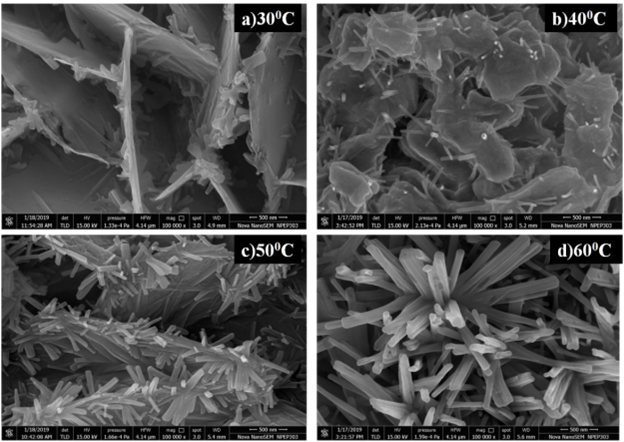NANOSYSTEMS: PHYSICS, CHEMISTRY, MATHEMATICS, 2020, 11 (2), P. 223–229
Effect of bath temperature on morphological and optical properties of ZnS films prepared by electrochemical deposition technique
Jitendra Borse – Department of Physics, Late Pushpadevi Patil Arts and Science College, Risod, India; jaborse@gmail.com
Arun Garde – Department of Physics, S P H Arts, Science and Commerce College Nampur, Nashik, India – arungarde@yahoo.co.in
Zinc sulfide thin films were synthesized by means of cyclic voltammetry technique onto stainless steel substrate. The electrolyte bath of aqueous solution containing 0.1 N Zinc sulfate (ZnSO4·7H2O) and 0.1 N sodium thiosulfate (Na2S2O3·5H2O) with 0.1 N Triethanolamine was used as complexing agent. Cyclic voltammetry was employed to measure its ranges of deposition voltages and thickness of ZnS thin films can be controlled by number of voltage cycles applied during deposition. Also we obtained hysteresis curve that imply its potential application. The bath temperatures were varies from 30 °C to 60 °C. The Influence of bath temperatures on optical properties and morphology has been investigated in details. The electrochemical deposited ZnS thin films were characterized by UV-visible spectroscopy and the field emission scanning electron microscopy (FESEM). The UV-visible spectroscopy analysis showed that energy gap varied between 3.99 to 3.79 eV depending on bath temperatures. The FESEM analysis showed that ZnS thin film deposited at various bath temperatures are polycrystalline nature, homogenous, uniform with randomly oriented nanoflakes and nanorods. The good quality of zinc sulphide thin film could be prepared in the presence of triethanolamine.
Keywords: electrodeposition, bath temperature, ZnS-thin film, morphological and optical properties.
DOI 10.17586/2220-8054-2020-11-2-223-229
